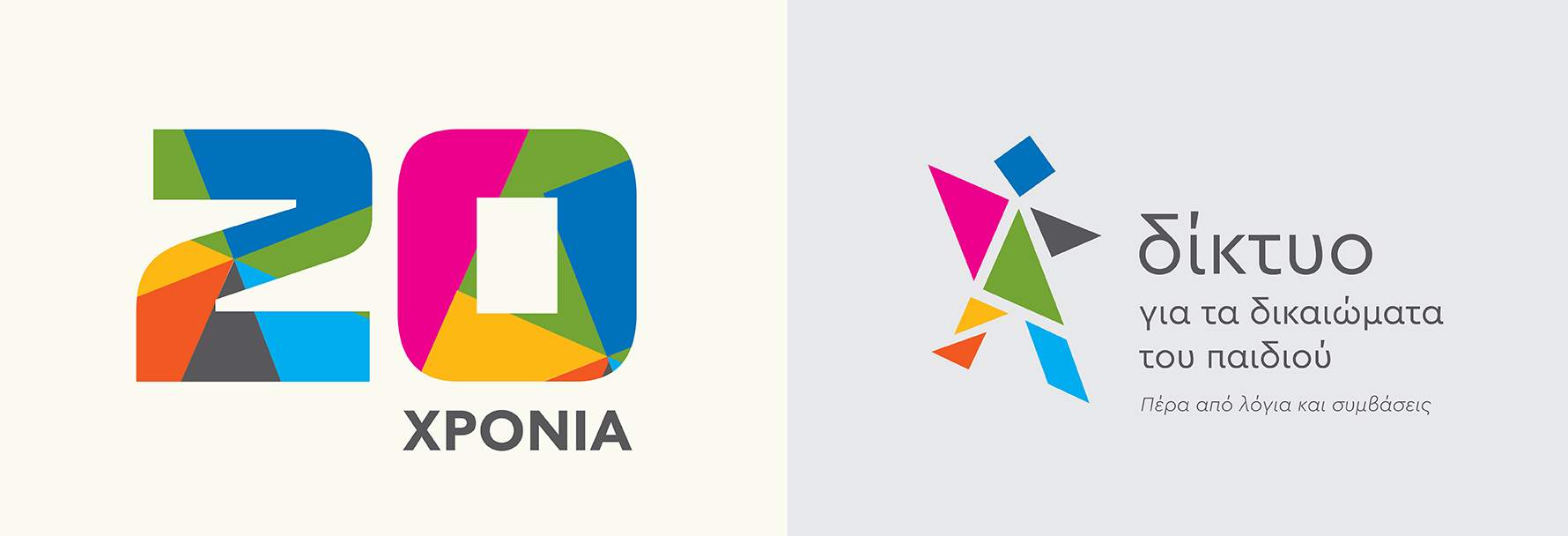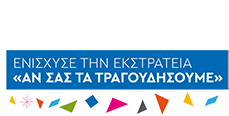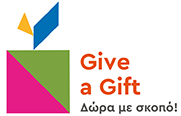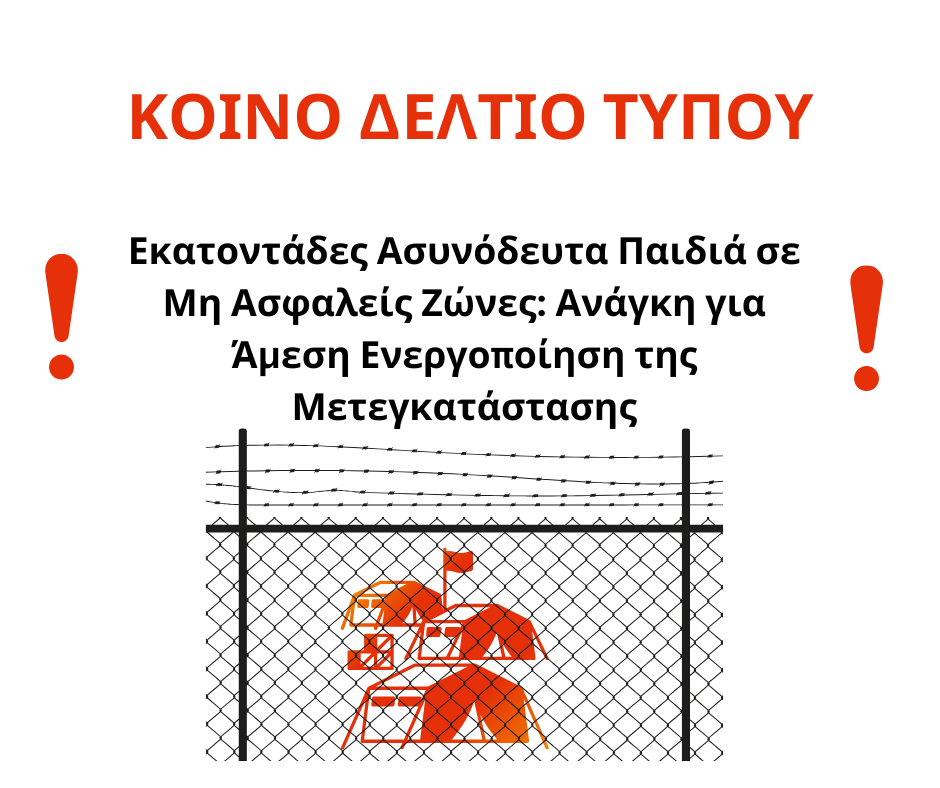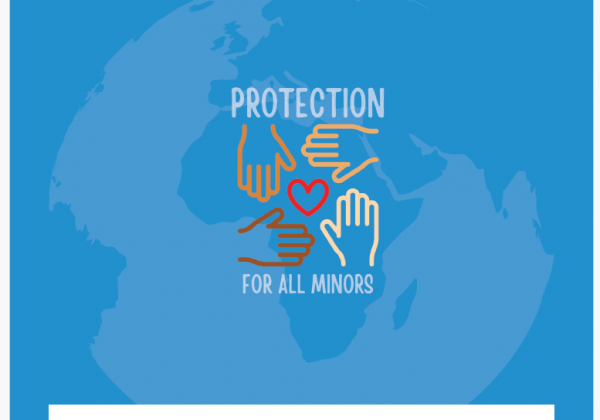JOINT PRESS RELEASE
Hundreds of unaccompanied children in Unsafe Zones: Need for an Immediate Activation of Relocation
Athens, [05.12.2024] -According to the latest statistics of the Greek Ministry of Migration and Asylum and the experience of civil society organizations participating in the Child Rights Advocacy Network (CRAN), the situation for unaccompanied children in “Safe Zones” – where they should be accommodated for the minimum possible period of time [1] – is no longer safe for them.
Reports from frontline professionals and media highlight the presence of hundreds of children currently on the Aegean islands, particularly in Samos, Leros and Kos, many of whom are without clothes and shoes, lacking safe accommodation and access to health and education services. Both on the islands and on the mainland, in the “Safe Zones” of Malakasa and Diavata, unaccompanied children are already waiting weeks for their application for international protection or family reunification with their relatives in other EU Member States to be filed.
Unaccompanied children who have arrived alone, after a particularly dangerous and usually traumatic journey, come from environments of persecution and/or extreme poverty and are already in a particularly vulnerable situation when they arrive. The conditions in the “Safe Zones” within Reception and Identification Centres (RICs) and in Closed Access Controlled Centers (CCACS) put them at greater risk as they do not have adequate and timely access to basic services, including that of Guardianship. Another issue that has so far contributed to the delay in the transfer of children to safe housing is the inadequacy of interpretation services[1] for months, but also the lack of sufficient long-term accommodation places, which was reduced from 2,024 in July 2024 to 1,771 in August 2024, contrary to the National Strategy for the Protection of Unaccompanied Minors, which sets a target of 2,500 places.[2]
The number nor the pace of children arriving is not a predictable figure. What can be predictable, however – in addition to the strengthening of appropriate accommodation structures to cover exceptional circumstances- is the maintenance of enough accommodation places in accordance with the above National Strategy target number, as well as the activation of the Relocation mechanism, when the appropriate accommodation places are not sufficient. The stay of children in RICs and CCACs can only be in line with the basic principle of protecting the best interests of the child as an absolutely short-term solution and only for the purpose of registering their applications for international protection within a few days and prepare their transfer to a safe and age-appropriate accommodation unit.
To this end, it’s necessary to:
- Immediately register any asylum applications (including family reunification), with priority given to the rapid transfer of unaccompanied children to safe sheltering, where with the assistance of their guardians will receive all necessary services.
- Strengthening unaccompanied children’s accommodation capacity by increasing the number of places in shelters and/or the number of shelters and semi-independent living arrangements in apartments.
- The immediate activation of the Relocation mechanism, so that children can be safely transferred to other EU member states, in the context of fair sharing of responsibilities and solidarity, which is also the content of the EU Pact on Migration and Asylum.
The undersigned Civil Society Organisations, members of the Child Rights Advocacy Network (CRAN):
- Άρσις –Κοινωνική Οργάνωση Υποστήριξης Νέων/ ARSIS – Association for the Social Support of Youth
- Changemakers Lab
- Δίκτυο για τα Δικαιώματα του Παιδιού / Network for Children’s Rights
- Ελληνικό Συμβούλιο για τους Πρόσφυγες / Greek Council for Refugees
- Human Rights Legal Project
- International Rescue Committee (IRC) Hellas
- Καλύτερες Μέρες Ελλάδα / Better Days Greece
- Lighthouse Relief
- Safe Passage International AMKE
- Samos Volunteers
- “Σχεδία” Κέντρο Παιδαγωγικής και Καλλιτεχνικής Επιμόρφωσης / Schedia (Raft) -Center for Artistic and Pedagogical Training
- Terre des Hommes Hellas – Γη των ανθρώπων
[1] According to no 23/13532 Decision of the Minister of Immigration and Asylum (Government Gazette B 5272/2020, art. 22, par. 4: “The stay of unaccompanied minors in the Safe Zones is limited to the minimum possible period of time, as it is a temporary solution until a long-term, sustainable solution is adopted for each minor (e.g. family reunification, relocation, integration).”
[2] Among others, see Refugee Support Aegean Press Release, Major deficiencies in the provision of interpretation services in Greece, 5.11.2024
[3] Ministry of Migration and Asylum, National Strategy for the Protection of Unaccompanied Minors, 2022, p.33: “It is necessary to increase the capacity of the country’s sheltering system for unaccompanied minors in order to meet the needs and the realize the rights of unaccompanied minors, by strengthening long-term accommodation and aiming specifically at two thousand five hundred (2,500) places.” (unofficial translation)
